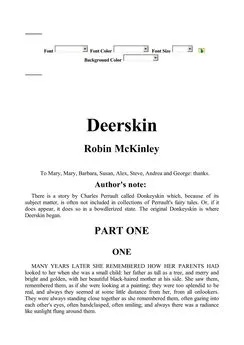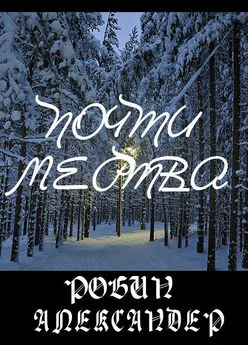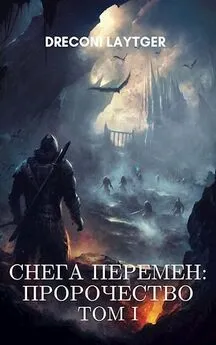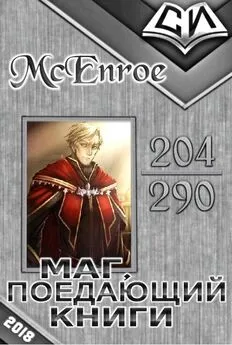Deerskin - Robin McKinley
- Название:Robin McKinley
- Автор:
- Жанр:
- Издательство:неизвестно
- Год:неизвестен
- ISBN:нет данных
- Рейтинг:
- Избранное:Добавить в избранное
-
Отзывы:
-
Ваша оценка:
Deerskin - Robin McKinley краткое содержание
Robin McKinley - читать онлайн бесплатно полную версию (весь текст целиком)
Интервал:
Закладка:
She stared at her glowing hands, and she felt her dogs pressing around her, offering her their courage, offering her their lives in any way she might ask of them.
In a new, hard voice, she said, "I was no child, for you and my mother gave me no childhood; and my maidenhood you tore from me, that I might never become a woman; and a woman I have not become, for I have been too afraid.
"But I return to you now all that you did give me: all the rage and the terror, the pain and the hatred that should have been love. The nightmares, and the waking dreams that are worse than nightmares because they are memories. These I return to you, for I want them no more, and I will bear them not one whit of my time on this earth more."
But she staggered again, and dropped to one knee, and loosed her hands from each other, and clasped her belly, and curled around it, and the glow curled around her, like a halo, or like the embracing arms of a beloved friend. "Ah, no!" she cried, in a voice like the sound of the executioner's axe; and Lilac huddled down farther by the cistern while hot tears ran from her eyes down her folded legs, digging her knees into her eyesockets as if to stop the tears, but they swelled and overflowed anyway, and ran down the insides of her thighs.
"No!" cried Lissar. "I cannot bear it again. I cannot!" And Ash turned, and sank her teeth into Lissar's shoulder, but only to bruise and startle; she did not break the skin, or perhaps the deerskin dress did not let her. Lissar's eyes flew open, and she gave one great cry, and a burst of blood flowed from between her legs, thick, dark blood, not bright blood as from a clean wound as had flowed from her hands. This was the secret female blood, heavy with mystery, and it mixed with the more innocent blood already shed; and the intermingled blood sank into the floor, leaving a pattern of arcs and spirals and long twisting curves that forever after seemed to move if any eye tried too long to trace them. In later years that bit of floor came to be declared an oracle, and persons who wished advice on some great matter came to look at it, and see where the pattern led them, and many came away comforted, or clearer in their minds, and able to make decisions that had seemed too hard for their strength. And the throne room became the oracle room, bare and plain, containing nothing but the glowing pattern on the floor, and the shadows of the stained glass, which moved less enigmatically.
"I give it back to you," said Lissar, panting, on her knees, marked with her own blood. "All-I give it all back to you." And suddenly she was again the blazing figure she had been when she stepped across the threshold into the throne room, but she was all the colors of fire now, no longer white but red and golden. She stepped up onto the dais.
But for some of those watching the woman made of flame was two women, and they were identical, except that they were inimical. Some who saw thought of Moonwoman, and how she is both black and white, but they rejected the image, for Moonwoman was still and always herself, and what they saw now was ... water and salt, wind and sand, fire and firewood-but which was the water and which the salt?
The watchers shivered, and wondered at what they saw, and wondered at themselves. Some of them remembered their own nightmares, and perhaps it was those who had nightmares to remember who saw the second woman: and they watched fearfully.
The two figures shimmered, red and golden, and there was no differentiating them, except that there were two; as if a mirror stood somewhere that no one could see, and none therefore knew which was the real woman and which the reflection.
But a change came, though the onlookers could not have said what the change was; only that the balance of their fear shifted, and they were suddenly afraid ... terrified
... panic-stricken at the thought that the one red-gold shape and not the other might be left when the mirror shattered, and only one remained.
If any of the watchers had looked further, they would also have seen that Ossin put out his hand toward one, toward one and not the other, though he was too far away to touch her. What those who watched did see was that one of the flame-women put out only one hand while the other reached out with both of hers; and in the moment before they touched the watchers saw that the beauty of the one who held out both her hands was the greater, but that the greater beauty was of the kind that stopped hearts and did not lift them or bring them joy. And it was she who was the more beautiful who suddenly was no longer there, and the flame-woman remaining opened and shut her single outstretched hand as if she could no longer remember what she was reaching for.
Deerskin, murmured the watchers who had seen the two women; we have our Deerskin. Their hearts lifted, in joy and not only in relief of terror.
And Lissar, dazed, knew that she had seen her mother, but did not remember how; and thought it was perhaps only a fragment of old nightmares. She shook her head; for she saw her father standing before her, but her vision was blurred and flickering, as if she saw him through a sheet of flame. Her father? Her mother? Her mother had been dead-dead-as dead as her daughter three nights after her seventeenth birthday; but no, her daughter had not died, but had lived . . . lived to see her mother again upon a mountaintop, a mountaintop covered with snow....
Nightmare. But nightmare was a word used to mean unimportant and not real; and she had seen her mother, then and now. Her hands trembled, with memory and with present pain: for both were burned, one as if it had been plunged in fire, or as if she had been hurled bodily into the fire but had miraculously escaped, all but her poor hand, which she had put out to save herself. The other felt burnt as if from a rope-as if a rope had been thrown, awkwardly and almost too late, a homely rope, meant not for such adventures but for the tethering of horses, the tying of ill-fitting doors shut or shaken-loose bits back on waggons.
Almost she had not noticed it, almost she had not recognized it; but she had grabbed it at the last, and her shoulder ached from the rough jerk, and her palm was lacerated with the coarse fibers of it. But her hands were only sore, and she was alive.
Alive: alive and here, not in her father's court, no longer on a mountain, but in the throne room of the Gold House, watched by the people who had taken her in, a year ago, taken her in only because she had asked it, asked for work to do and a place to stay. How dared she answer their generosity by destroying the triumphant marriage of their princess-was it not enough that she had destroyed her own place among them?
She blinked: for her mother's face briefly re-formed before her, swimming into existence from the dizzy golden-red blur before her eyes. But it was not her mother's face, but the face of the painting, the painting that had hung behind her father's throne since her mother had died. The painting was there before her, as beautiful and horrible as she remembered, as clear as though she could touch the painted canvas; she recoiled from the thought, recoiled from the painting, recoiled from her mother: No! she told it. No! And the golden-red blur thickened, but as she stared, wide-eyed, her mother's face began to blacken, her mother's eyes dimmed and became only cracked paint, and the smell of burning canvas was in her nostrils.
She blinked again: and knew where she was, and why, and that she came not to destroy Camilla's future but to save it. She saw who stood before her, and recognized him, and did not cringe, although she hated what must come next. And she strode forward onto the dais, and all cowered away from her, all but two.
Her father she seized, she knew not how, for she would not have touched his flesh willingly; nor could those looking on decipher how the flame licked at him; but a look of horror, of an understanding beyond the grasp of mortality, and beyond the profoundest guesses of the still living about the darkest pits of hell, ran fingers like claws over his face, and left a broken old man where a proud king had once stood.
The entire dais was lit as if by flame, and all those that stood by heard a roaring in their ears, as if the entire city was burning down around them. Almost they felt the heat of it, and the air seemed too hot to breathe, and struck harshly on their faces; and outside the throne room the people looked through the shattered doors as if down the red gullet of a Great Dragon.
When the fire released him, the foreign king would have fled, but his own ministers stood in his way, as they tried to press as far from this unknown figure of fire as they could: there had been something about Lissar, but this was not Lissar; this was-something beyond their ken. This was some outlandishness from a barbarian country steeped no doubt in witchcraft; it had been chosen merely because it was the nearest with a marriageable princess. This had been a mistake. It had nothing to do with them. They coughed, and their eyes burned, as if from standing too near a fire. When the dreadful being that stood too near them spoke, they heard the snarl of a crackling fire; but they feared to turn their backs on it to flee to a safer distance because of the seven vast lion-like creatures that stood around it, their jaws a little parted so the white teeth showed, their brilliant eyes fixing at once on any sudden movement. The ministers shuddered, and one of them wept, and so they barred their own king's way in their fear they would not accept as fear. Yet the king could not have fled as he wished even had the way been clear, for he was an old man now, and weak, and slow.
Ossin was the other figure who had stood firm at the coming of the fire. He was the only one of all in the room who had both seen what all the others had seen and yet equally still seen Lissar. He did not think the fire would burn him, or perhaps he did not care. "Deerskin," he said. "Lissar."
She turned to him, and tears of fire and blood were spilling down her cheeks, and her eyes, draining of their blackness, were fire-amber. "Lissar," he said, wonderingly; for now he saw what once had been the girl in the portrait, although the woman before him was much more than the poor, proud, though undeniably beautiful girl in the portrait gave any promise of becoming. "Lissar," he said, with love and sorrow, and reached fearlessly out to touch her burning face.
But she flinched away from his touch, as she had flinched away from him on a balcony half a year ago, and he saw the stricken look come into her clear amber eyes, followed by yearning and despair; and then she turned away from him, and sprang down from the dais, and ran to the broken doors; and the long ribbon of lion-dogs uncoiled itself and ran after her. The way opened for her, like a silvery line of Moonbeam; but behind her it closed in again, like shadows. But more solid than shadows, for when he reached after her, bodies blocked him, as there was a rush for the dais from his courtiers, to catch the foreign king as he fell.
She had a long start on him, for he would not force his way through the shocked, bewildered crowd at the risk of hurting anyone, and it was some minutes before he won his way to the gaping doors. And he knew how swiftly she could go. But he refused to lose her again, and he set his teeth, and thought, agonized and hopeful, that she must be weary to heart and bone; she could not go far without rest. Not even to escape him. When she had fled from him the night of the ball it had been too dark to see clearly; but today he had seen her face, lit by her own light, and he had seen the yearning and the stricken look. He would not let her escape, and he thought he understood now how he might hold her-or he knew how he might try, and then hope and agony blinded him. If he had not needed to pursue her at once, he would have killed her father with his bare hands, he who offered a prayer that his shaft or blade might fly straight to the heart of every beast he caught hunting, to spare it pain and fear, and thanked its spirit after its death for giving him meat for his people. He could have killed this other human being with his bare hands.
Читать дальшеИнтервал:
Закладка:








![Makenlo - Маг, Поедающий Книги. Главы 101-203 [некоммерческий перевод с корейского]](/books/1101097/makenlo-mag-poedayuchij-knigi-glavy-101.webp)

